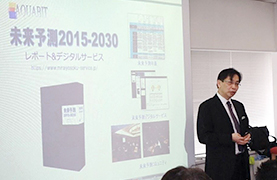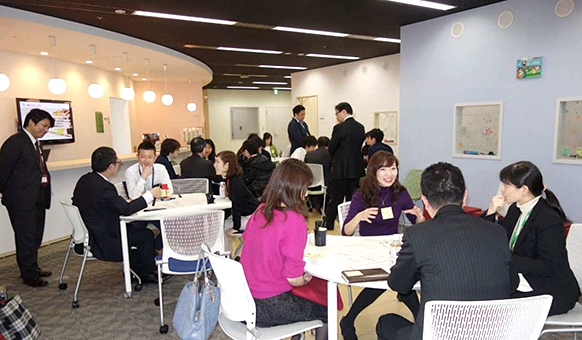In-House Environmental Seminar and Workshop
- Workshop "2030 Future Forecasting Seminar + Ideathon"
- Seminar "Enforcement of Paris Agreement-Business Strategies in the Era of Reform"
- Seminar "Environmental Seminar: Learn SDGs"
NOTE: this is an archived page and the content is likely to be out of date.
(March to April 2017)
Purpose of the workshop:
Since 2015, when two new frameworks of the Sustainable Development Goals (SDGs) and the Paris Agreement were established, the international community has been greatly accelerating its movement toward the solution of environmental and social issues. In this trend, the roles of companies are considered important, and in Fujitsu Group's Environmental Action Plan (Stage VIII), we have set contributing to a sustainable society by ICT services as a target. To strengthen the movement to create new ICT services that can solve environmental and social issues, we held the workshop to obtain clues regarding new business endeavors, including the kinds of services that will be required of ICT in the future.
Mr. Tanaka explained that growing shortages of food, water, resources, and energy can be anticipated because of population increases and economic growth in developing countries. Sustainability in future forecasting indicates that the shortages (of resources) will cause our society to be unsustainable if this situation continues. As the spread of cars in China and India will be accelerated in the future, it is clear that we will face the shortage of oil-based energy. However, as we will be able to secure electric power, the spread of electric cars is expected. Mr. Tanaka, a specialist in future forecasts, provided us with new and insightful viewpoints.

In groups of four or five, participants brainstormed about services in the World Café style, considering the mobility in society to be realized by 2030. Ultimately, they created "service design sheets." Mr. Tanaka encouraged participants to offer more out-of-the-box ideas. Based on his advice that the ideas everyone accepts are the ones that should have already been executed and that a new business is created by ideas everyone doubts, participants generated many new ideas for creative services. We believe that these ideas will be used for the creation of new ICT services in the future.

